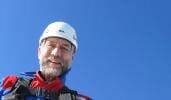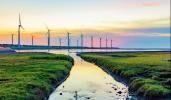2
Why did you choose to pursue a career in this industry?
“I suppose it started when I was younger, the natural world and the ocean had always fascinated me. I found deep sea exploration really interesting as we know so little about what lies beneath the surface of the waves. One time I was watching a programme about ROVs and how they are operated and I thought ‘that looks amazing, I would love to do that job one day’.”
Did you study an industry related subject to become an ROV Pilot?
“No, it was just my interest in the ocean and that TV programme that drove me into the ROV industry. I had a lot of previous experience as a mechanical engineer working on fibre optic cables. So I decided to develop my skills and join the military. Seven years later I transferred my skills and knowledge to pursue my first interest, which was the ROV industry. After applying to a number of jobs, I was finally given the opportunity to work as a mechanical engineer for an offshore company. After a year and a half of working there, I got the opportunity to actually work offshore on a wind farm and since then I’ve never looked back.
“One of my friends is an ROV guy and I never really questioned him about his career as he was always away. Eventually he told me what he liked about it and what you need to have to work in this industry. He also showed me pictures of his time offshore, videos, diagrams and from then on I was hooked.”
How would you describe your day-to-day offshore?
“Having a routine is good as its keeps your brain fresh and active, however, every day is different offshore; the ROV may break down then we have to work on it longer to get it fixed. But that’s the great thing about working in a team as everyone has their own knowledge about the industry and they all pass it onto one another, so it’s great to work in a team.
“After I’ve had my morning coffee I head over to the shack where the supervisors will give us the handover of what’s happened during the night. This handover shows the general operations during the night, any change in direction or speed of the ROV and a weather report. The handover is very detailed and it will allow us to decide on the next course of action.
“I’ve worked on a range of projects such as wind farms, geological surveys, platform inspections, pipeline inspections, shallow water and deep water construction. The great thing about Atlas is that they give me a good variety of work; the opportunities I have had and the places that I have been has increased my knowledge and passion for the industry.”
What has been the most memorable experience of your career?
“There were a couple of projects I have worked on that stand out for me. When I was working out in Russia, we were asked to install building blocks around a platform to stop ice forming and damaging it. However, we were working in 6 metres of water so that was a first for me. It was a potentially dangerous operation for the ROV but it was also an essential one so there was no way around it. This was very intricate work and it was mentally straining, however, it was a great feeling when the job was successfully completed.
“Flying the ROV in between platforms can be quite challenging as you have to be aware of what your tether is doing, where you’re going, how you’re going to get there, how you’re going to get back and what the dangers are.
“The most enjoyable part of the job is flying the ROV inside platforms. Another project that I remember was in Thailand were we had to inspect 50 platforms. People might think it’s monotonous doing the same thing over and over, but it was really cool working out there and do what I love doing.”
What’s the next step in your career?
“I’ll be honest I absolutely love my job, it’s why I get up in the morning. For me, flying an ROV is like driving a fast sports car; I’ll never get sick of it. The only aspiration I have is to move up the ROV ladder to a superintendent position, obviously that’s a little way away for me yet, but I love flying and maintaining ROVs and working with some great lads that you find in the industry.”
.png)
.png)


